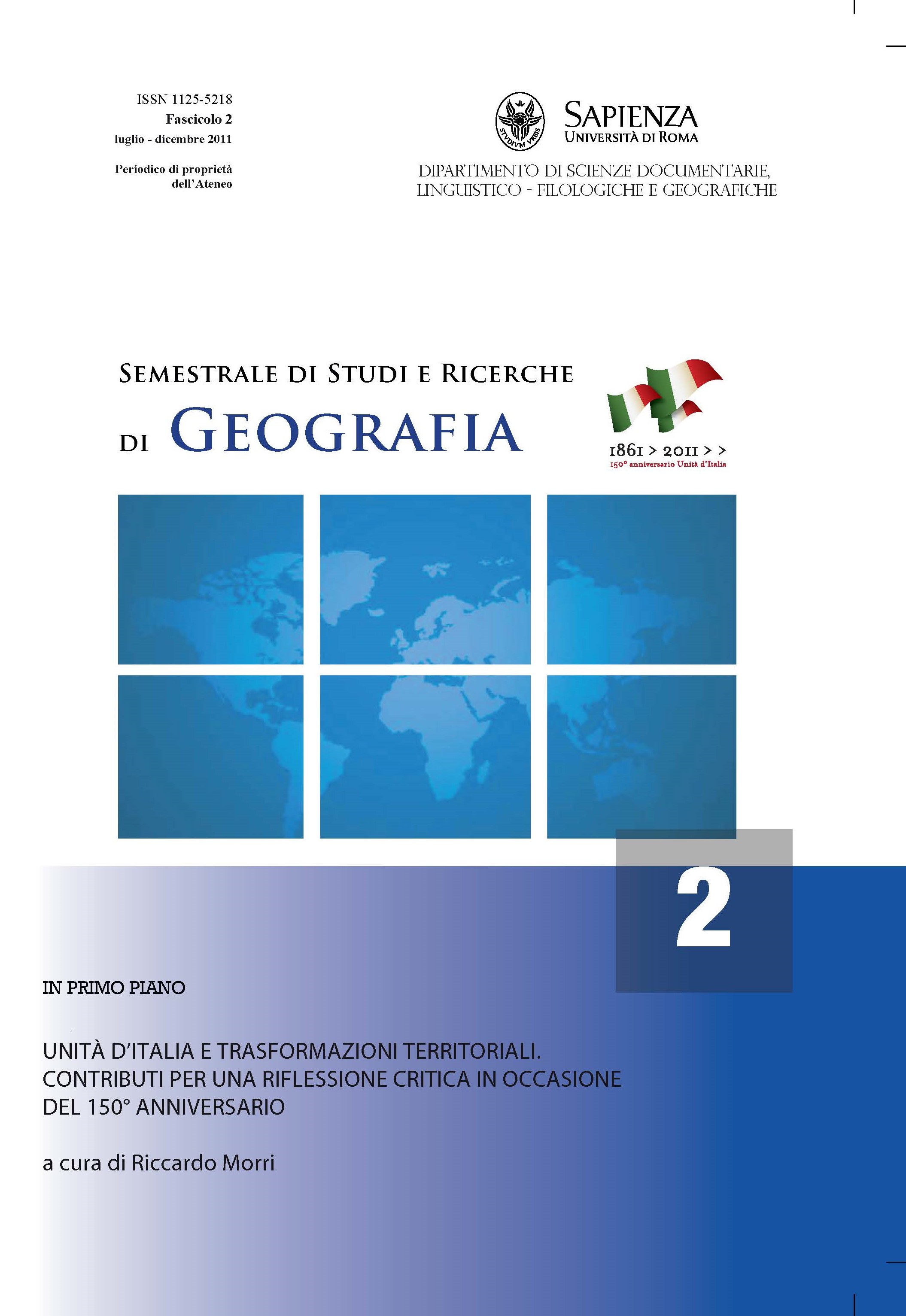Il Nord senza bussola: dinamiche spaziali e strategie territoriali a centocinquant’anni dall’Unità
DOI:
https://doi.org/10.13133/1125-5218.15208Abstract
The North without a compass: spatial dynamics and territorial strategies to a hundred and fifty years from the unification of italy
The paper examines the rise of a ‘North’ region within the contemporary
Italy in the light of the ‘crisis’ of nation-statehood experienced
throughout Europe during the last decades. Although the idea of a
state demise is questionable and, rather, definitively ascribed to the rise of a
post-national state, the magmatic condition of the Italian regional entities is
challenging the old state edifice emerged from the Post-War Constitutional
Assembly.
This ‘North’ region is investigated according to a manifold point of view:
that of a very mosaic of many local systems strongly differing from each
other – metropolitan areas, industrial districts, networks of medium-sized
cities; that of a social construct which exists under specific conditions and
for specific actors, who can change their scalar references; and finally that
of a political mobilisation on the base of a mix of economic and cultural elements, analysed through the lenses of the New Regionalism approach.
The main aim of the paper is to deconstruct the rhetoric of ‘North’,
practised by political actors and movements but quickly spread to the public
debate, affecting the imaginary of Italians. We do not deny the reality of
the social and economic differences featuring the ‘North’ as a whole in
comparison to the other parts of the Italian territory, but, at the same time,
we argue the existence of deep contrasts within the supposed unitary
‘North’.
Keywords
Regionalism, local systems, North.
Le Nord sans boussole: evolutions spatiales et stratégies territoriales à cent cinquante ans de l'Unité
L'article analyse l’essor d’une région «Nord» à l’intérieur de l’Italie
contemporaine, à la lumière de la «crise» de l’Etat-nation expérimentée
en Europe pendant les dernières décennies. Même si l’idée d’un abandon du camp par l’Etat est questionnable et imputable, plutôt, à la naissance d’un Etat post-national, l’activisme des gouvernements régionaux italiens est en train de challenger l’ancienne architecture institutionnelle conçue par l’Assemblée constitutionnelle après le Fascisme.
Cette région «Nord» est investiguée selon des différents points de vue:
celui d’un véritable mosaïque de plusieurs systèmes locaux qui diffèrent l’un
de l’autre – agglomérations métropolitaines, districts industriels, réseaux de
villes petites et moyennes; celui d’un construit social qui existe sous des
conditions et pour des acteurs particuliers, qui peuvent changer leur références
d’échelle; et, finalement, celui d’une mobilisation politique sur la
base d’un ensemble d’éléments économiques et culturels, analysés à travers
les lentilles du Nouveau Régionalisme. Le but principal de cet article est celui de déconstruire la rhétorique du «Nord» telle que pratiquée par les acteurs et les mouvements politiques mais diffusée très vite dans le débat publique, affectant l’imaginaire actuel des Italiens. On ne dénie pas la réalité des différences sociales et économiques qui caractérisent le «Nord» comme une entité unique par rapport aux autres composantes du territoire italien, mais, en même temps, on soutient l’existence de contrastes profonds à l’intérieur d’un «Nord» supposé comme unitaire.
Mots-clés
Regionalism, systems locaux, Nord.
Downloads
Published
Issue
Section
License
Gli autori che pubblicano su questa rivista accettano le seguenti condizioni:- Gli autori mantengono i diritti sulla loro opera e cedono alla rivista il diritto di prima pubblicazione dell'opera, contemporaneamente licenziata sotto una Licenza Creative Commons - Attribuzione che permette ad altri di condividere l'opera indicando la paternità intellettuale e la prima pubblicazione su questa rivista.
- Gli autori possono aderire ad altri accordi di licenza non esclusiva per la distribuzione della versione dell'opera pubblicata (es. depositarla in un archivio istituzionale o pubblicarla in una monografia), a patto di indicare che la prima pubblicazione è avvenuta su questa rivista.
- Gli autori possono diffondere la loro opera online (es. in repository istituzionali o nel loro sito web) prima e durante il processo di submission, poiché può portare a scambi produttivi e aumentare le citazioni dell'opera pubblicata (Vedi The Effect of Open Access).


